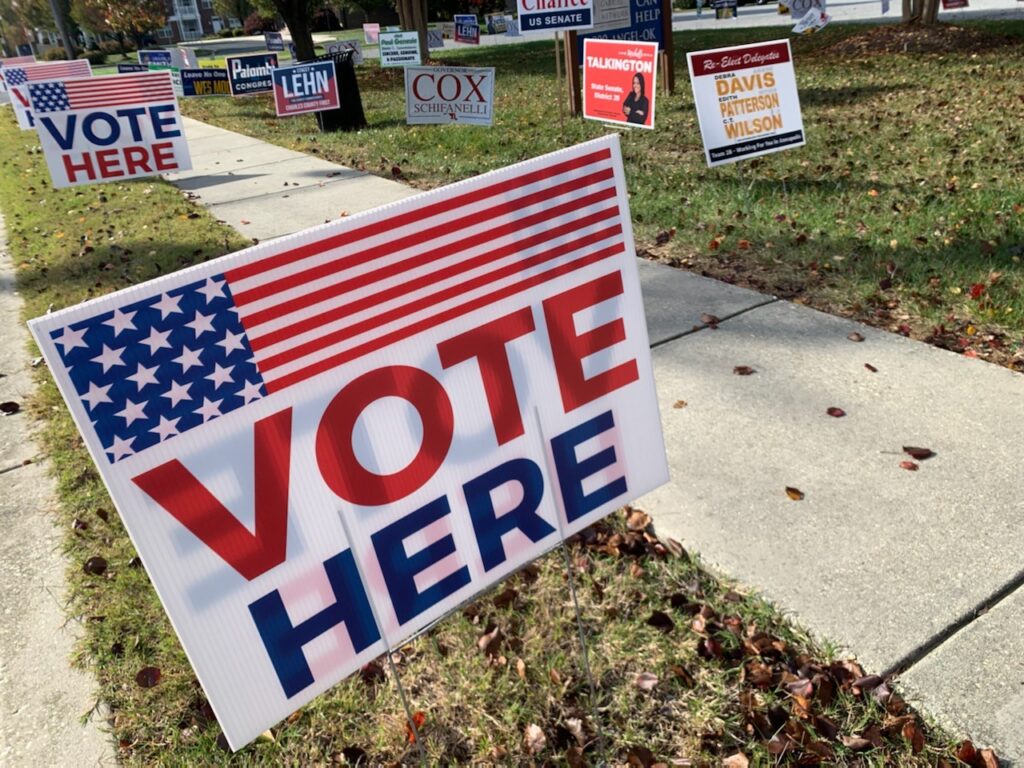Signs direct voters to a polling place at Sacred Heart Church in La Plata. (File photo by Angela Breck/Maryland Matters)
In April 2024, the St. Mary’s County Board of Commissioners grappled with a consequential decision: Whether to increase taxes to adequately fund schools or decrease taxes at the potential expense of educational quality, teachers’ salaries, and specialized programs.
This debate divided community members, with one critical group notably absent from the conversation—students. Although the outcomes would directly impact them, students had no vote, no representation, and little say in a matter pivotal to their futures.
This situation highlights a glaring democratic gap: 16- and 17-year-olds are largely affected by decisions that shape their education, communities and futures, yet they remain disenfranchised. Maryland can and should address this inequity by lowering the voting age in local elections, starting a new chapter of democratic inclusion and civic engagement.
As demonstrated by Takoma Park and others, Maryland’s legal framework already lets cities regulate local elections. Under this policy, extending voting rights to 16- and 17-year-olds in local elections is very simple and amplifies youth voices in critical issues such as education funding, environmental sustainability and public safety.
Policymakers in Maryland have already spearheaded this effort, advocating to lower the voting age to 16 statewide. For example, the Your School, Your Voice Act, introduced by Del. Joe Vogel (D-Montgomery), gives counties the authority to lower the voting age to 16 in Board of Education elections.
Your opinion matters
Maryland Matters welcomes guest commentary submissions at [email protected].
We suggest a 750-word limit and reserve the right to edit or reject submissions. We do not accept columns that are endorsements of candidates, and no longer accept submissions from elected officials or political candidates.
Opinion pieces must be signed by at least one individual using their real name. We do not accept columns signed by an organization. Commentary writers must include a short bio and a photo for their bylines.
Views of writers are their own.
“Legislators consider hundreds of pieces of legislation that directly impact young people — issues like how to fund their schools adequately, secure safe communities that don’t lead to their over-incarceration, and more should center their voices and experiences. The ability to vote in some of our elections will ensure their input is truly considered.” – Joanne Antoine, executive director of Common Cause Maryland.
Maryland is no stranger to innovation in local governance. In the past 13 years, eight Maryland cities, including Takoma Park, have extended voting rights to 16- and 17-year-olds. Takoma Park’s experience provides compelling evidence of success: In the first election after the change, turnout among 16- and 17-year-olds exceeded that of any other age group.
Since then, similar initiatives in California, New Jersey, Vermont, and even 22 countries including Austria and Argentina have demonstrated that engaging younger voters strengthens democracy.
Critics argue that teenagers lack the maturity to make informed voting decisions. However, research by Temple University and others counters this assumption. Studies find that 16-year-olds possess the same cognitive ability for “cold reasoning” — logical, deliberate decision-making — as adults. Moreover, adolescents at this age are more likely to be embedded in stable social environments, often surrounded by peers and family members who model civic participation, fostering the development of lasting voting habits.
Another misconception is that teens merely mimic their parents’ choices. Evidence from Scotland’s independence referendum shows that 40% of young voters had different preferences than their parents, proving that young people are independent thinkers capable of nuanced decision-making.
Generation Z, often lauded for its activism and leadership, has already demonstrated its readiness to contribute meaningfully to civic life. From organizing climate strikes to advocating for gun-violence prevention, today’s young people are profoundly shaping public discourse. Their engagement underscores the urgent need to grant them formal representation in the electoral process.
Opposition to lowering the voting age often hinges on a perceived link between voting and legal adulthood. Yet this argument overlooks the fact that 16-year-olds already participate in society in meaningful ways: They work, pay taxes and drive. It is only fair that they have a voice in the policies that affect their daily lives and futures.
Public opinion also supports this shift. Research from the University of Maryland’s Center for Democracy and Civic Engagement reveals that Americans are increasingly open to lowering the voting age. Federal lawmakers, including Democratic Reps. Grace Meng of New York and Ayanna Pressley of Massachusetts and former Texas Republican Rep. Michael Burgess have championed this cause, citing the unique perspectives and passion that young people bring to our democracy.
Maryland can lead the nation by expanding democratic participation to younger residents. Organizations like Vote16USA, Vote16MD, Common Cause and others have laid the groundwork, advocating tirelessly for this change and empowering student leaders to take center stage.
The time to act is now. Maryland can build a brighter future by ensuring all its citizens — regardless of age — have a voice in shaping it. By granting 16- and 17-year-olds the right to vote, we affirm their stake in our shared future and strengthen our democracy for generations to come.
Read the full article here
